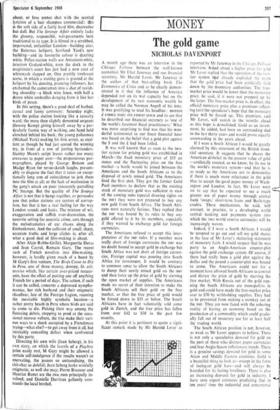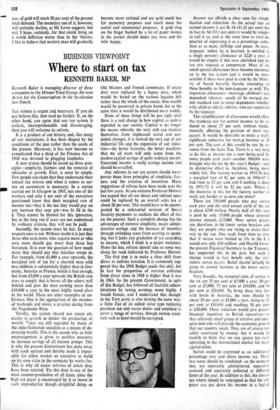The gold game MONEY
NICHOLAS DAVENPORT
A month ago there was an interview in the Chicago Tribune between the well-known economist Mr Eliot Janeway and our financial secretary, Mr Harold Lever. Mr Janeway is the author of that best-selling book The Economics of Crisis and as he clearly demon- strated in it that the influence of America depended not on its war capacity but on the development of its vast economic wealth he may be called the Norman Angell of his time. It was gratifying to read his headline: BRITISH
COMES THRU ITS FINEST HOUR and to see. that he described our financial secretary as 'one of the world's foremost fiscal practitioners.' What was more surprising to find was that his won- derful testimonial to our finest financial hour was based on the belief that a gold plot against the $ and the £ had been foiled.
It was well known that as soon as the two- tier system for pricing gold was established in March—the fixed monetary price of $35 an ounce and the fluctuating price on the free market—a battle would be joined between the Americans and the South Africans as to the disposal of newly mined gold. The Amerioans fired the first shot, They got the former Gold Pool members to declare that as the existing stock of monetary gold was sufficient in view of the coming SDRS (special drawing rights on the IMF) they were not prepared to buy any new gold from South Africa. The South Afri- cans were naturally furious. They replied that the IMF was bound by its rules to buy any . gold offered to it by its members, especially if they wanted to exchange gold for foreign currencies.
The Americans refused to accept this inter- pretation of the IMF rules. If a member were really short of foreign currencies the IMF was no doubt bound to accept gold in exchange but South Africa was not short of foreign curren- cies. Foreign capital was pouring into South Africa for investment. It would be contrary to common sense to allow the South Africans to dump their newly mined gold on the 'IMF and then force up the price of gold by starving the open market of supplies. The Americans made no secret of their intention to make the South Africans sell their gold on the free market, so that the free price of gold would be forced down to $35 or below. The South Africans have in fact voluntarily sold some gold in Zurich, and the free price has fallen from over $42 to $38 in the past few months.
At this point it is pertinent to quote a signi- ficant remark made by Mr Harold Lever as
reported by Mr Janeway in the Chicago Tribune interview. Asked about a higher price for gold Mr Lever replied that the operation of the two- tier system lied already exploded the myth that the gold price had been artificially held down by . the' vnonetary authorities. The free-
• market price would be lower than the monetary price, he said,, if it were not propped up by the latter. The free-market price is, in effect, the official monetary price plus a premium reflect- - ing (sic) the speculator's hope that the monetary price will be forced up. This premium, said Mr Lever, will vanish in the months ahead as this hope is demolished. Gold as an invest- ment, he added, had been an outstanding dud in the last thirty years and would prove equally unrewarding in the years ahead.
If I were a South African I would' be greatly alarmed by this statement of the British finan- cial secretary. It suggests :that he shares the American disbelief in the present value of gold —artificially created, as we know, by its use in the world's monetary system—and that he is as ready as the Americans are to demonetise if there is much more reluctance in the gold bloc to accept the good paper money of Wash- ington and London. In fact, Mr Lever went on to say that he expected to see a much greater use of paper money through central bank 'swaps,' short-term loans and Basle-type credits. These mechanisms, he said, will amount, in practice, to a developing world central banking and payments system into which the two world reserve currencies will be increasingly woven.
Indeed, if I were a South African, I would be tempted to go out and sell my gold shares in the face of Mr Lever's shattering statement of monetary faith. I would suspect that he was party to an Anglo-American counter-plot against the-gold exchange system. Of course, if there had really been a gold plot against the dollar and the pound a counter-plot was bound to come. The Americans could not for a moment have allowed South Africans to control and dictate the price of gold by starving the free market. With Russia out of the gold run- ning the South Africans are monopolists in gold and could have made the free-market price soar to $70 by withholding supplies. They had to be prevented from making a monkey out of the IMF. They are now faced with the sobering reality of having an economy based on the production of a commodity which could gradu- ally fall out of monetary use for at least half the trading world.
The South African position is not, however, as weak as Mr Lever appears to believe. There is not only a speculative demand for gold on the part of those who distrust paper currencies and fear Anglo-Saxon inflationary trends. There is a genuine savings demand for gold in some Asian and Middle Eastern countries. Gold is a beautiful thing to look at—except in the form of inelegant gold bars—and- will always be hoarded for its lasting loveliness. There is also an increasing demand for gold in industry. I have seen expert estimates predicting that in %ten years' time the industrial and ornamental
611..aa
orb uses of gold will reach 50 per cent of the present total demand. The monetary use of it, however, will certainly decline, as Mr Lever suggests, but not, I hope, suddenly, for that could bring on a world deflation worse than in the 'thirties. I like to believe that western man will gradually become more rational and use gold much less for monetary purposes and much more for useful and ornamental purposes. A gold ring on the finger backed by a lot of paper money in the pocket should make any man and his wife happy.







































 Previous page
Previous page